News-Press Trial Enters Third Week
Melinda Burns Stays Cool in the Hot Seat
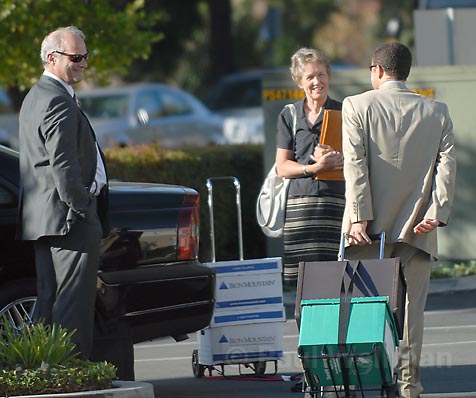
This is a longer version of the story that appeared in the printed edition of The Independent on Thursday, September 6.
It was the moment former News-Press reporter Melinda Burns had been dreading for months – facing cross-examination from attorney Barry Cappello, Santa Barbara’s renowned courtroom barracuda representing News-Press owner and co-publisher Wendy P. McCaw, with whom Burns and her union campaign has been battling the past 14 months. To prepare, Burns endured mock cross examination at the hands of National Labor Relations Board (NLRB) counsel Brian Gee. It turned out Gee’s Cappello impersonation was way too good for Burns comfort. But it would be Cappello, not Burns, who endured the serious and sustained courtroom scorching this Tuesday.
Almost every time Cappello asked Burns a question, he was peppered with a spray of objections from Gee, representing the feds who have charged the paper with nearly 20 labor law violations, and Ira Gottleib, who represents the Teamsters Union that employees voted 33-6 to join last September. More frustrating for Cappello was that Judge William Kocol upheld their objections with great speed and even greater frequency.
At one point, a clearly exasperated Cappello asked Kocol, “Can I know what grounds this [objection] was sustained on?” Kocol replied, “Several of them.” More troublesome for the News-Press, Kocol appeared to grow impatient with Cappello’s peppery theatrics, variously admonishing the News-Press attorney, “Please allow the witness to take her time,” “Mr. Cappello, please don’t interrupt me when I’m talking to the witness,” and the more frequent, “Please, Mr. Cappello.”
Even so, Cappello managed to score a few points against Burns, clearly one of the key union supporters within the entire News-Press newsroom. Cappello argued that Burns was fired last October not because she was pro-union – as the Teamsters and the NLRB allege – but because she was a biased reporter. Capello pointed out that columnist Marilyn McMahon hosted the first pro-union meeting in her home, but she wasn’t fired.
And, yes, Burns had amassed an impressive trove of journalistic awards and commendations during her 21 years with the News-Press, Cappello conceded, but each of her last five annual performance reviews contained cautionary language by her supervisors concerned about Burns’ “political passions” intruding into her news coverage. And her evaluation scores were steadily slipping, Cappello argued. In fact, Burns was so slanted in favor of migrant workers in her immigration stories, Cappello argued, that she received awards from the likes of La Casa de la Raza, Latinos for Better Government, and the Hispanic Chamber of Commerce.
Burns bias was evident, he claimed, in the fact that proponents of Measure D – a proposed transit and road improvement tax increase that went down to defeat last fall – lifted portions of an article she wrote on the matter as part of their campaign literature. Besides, Cappello contended, Burns couldn’t get her facts right, claiming six editors were “forced out,” when he insisted that they really resigned. Or on a more trivial note, she claimed that 900 people had attended a forum about the News-Press in Victoria Hall last summer when, in fact, the hall’s capacity is only 290. “It goes to credibility,” Cappello explained when asked by the judge about the relevance of that particular line of questioning.
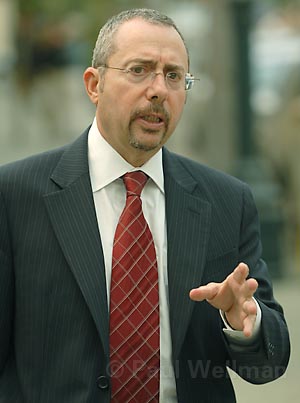
Finally, Cappello argued that comments Burns made since her termination last October – describing McCaw as a “grossly incompetent tyrant” and vowing to stay on the job until McCaw could be “ousted” – were too incendiary for the News-Press ever to hire her back. (Among the few remedies available to the Burns and the other seven News-Press employees in the wake of last Fall’s election in favor of the Teamsters is re-instatement with back pay.)
Burns was exceedingly soft-spoken on the witness stand, answering “yes” and “no” when possible, and as being as brief as possible most of the time. She acknowledged that she was a liberal, and said that she “took to heart” some of the criticisms leveled against her by her supervisors.
To the extent Cappello ever managed to cross swords with Burns, it was over the issue of journalistic ethics. Burns has complained since last summer that News-Press owner Wendy McCaw crossed the ethical line on several occasions, and that to protect themselves from such interference, newsroom employees needed to join a union and negotiate a contract that protects the newsroom from further encroachments. Specifically, Burns cited McCaw’s decision to reprimand former reporter Camilla Cohee for writing an article that listed the address of the proposed home actor Rob Lowe sought permission to build last summer, despite considerable opposition from neighbors who complained it was too large and would block their views. Lowe had sought to keep his address out of the paper, and afterwards McCaw personally wrote Cohee’s letter of reprimand, as well as three others for Cohee’s editors. At the time, the News-Press had no policy against listing such addresses, but afterwards, McCaw initiated a policy not to list the address of anyone who hadn’t approved such disclosure.
Cappello sought to shake Burns by citing the Society of Professional Journalists’ “Ten Commandments” of newsroom ethics. The SPJ cautioned that private individuals – as distinct for elected officials and other public figures – needed to be afforded more privacy protections unless some compelling public interest dictated otherwise. Was there a compelling public interest, he demanded, in revealing the street address of a well-known celebrity – and that of his wife and their two small children – when doing so might subject them to the predations of would-be stalkers and kidnappers? Without elaborating, Burns answered simply in the affirmative.
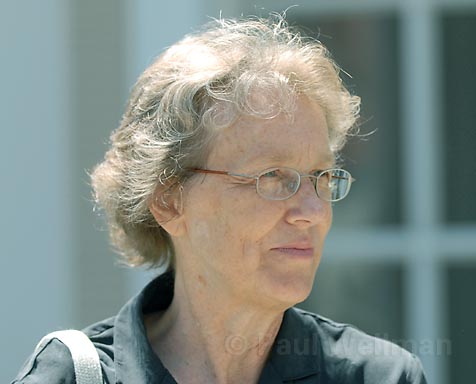
But later, when Judge Kocol questioned her on these same points, Burns proved far more expansive. She explained that the Lowes were involved in a high profile land-use dispute that had generated considerable controversy within Montecito. She noted that the house in question had not yet been built, that the Lowes did not live there, and she told the judge the dispute was no different than any number of similar land use disputes about which she’d written hundreds of articles over the years. It was customary practice in such matters, Burns said, for reporters to list the address of the property in question. Burns objected to giving preferential treatment to celebrities.
Cappello then tried to ask Burns if she was familiar with John Lennon, the ex-Beatle slain by a stalker in the early 1980s, and whether she thought the publisher of the News-Press would be within her rights implementing a policy that would have kept Lennon’s exact address out of public view. But the judge intervened, and ordered Cappello to ask an example more in line with the movable parts outlined by Burns in the Lowe case. After a few unsuccessful efforts, Kocol shut Cappello down.
It’s been Cappello’s contention that the newsroom employees wanted nothing more than complete control of what they wrote and when they wrote it, and he reiterated this argument Tuesday. He argued that several of the initial demands made by Burns and the other newsroom activists were either unreasonable or illegal. For example, Burns et al had initially demanded that former editor-in-chief Jerry Roberts and the other five editors who resigned last July be invited to come back to work. Cappello asked Burns if she was aware at the time that the News-Press had sued Roberts for breach of contract, and that Roberts had sued the News-Press. Burns said at the time she didn’t know. She also said that the union quickly dropped that demand.
Cappello also noted that the union’s demand to restore newsroom ethics was not subject to collective bargaining and subject to the protections afforded by federal labor law. He claimed that court precedent established that issues of newsroom ethics lay solely within the discretion of a newspaper owner or publisher, not with the newsroom employees. To the extent that the National Labor Relations Board claims that News-Press workers were illegally fired in pursuit of these ethical objectives, Cappello contends federal labor law affords them no fig leaf of protection.
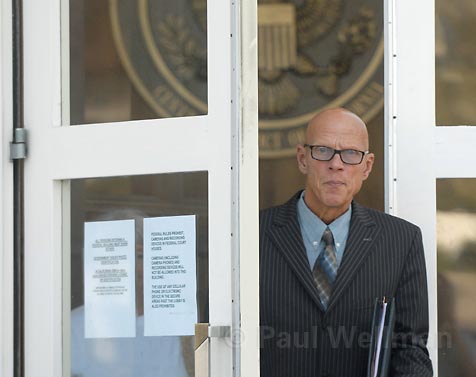
Teamsters attorney Ira Gottleib countered that even if Cappello were legally correct, he said the fact that News-Press workers were seeking both recognition as a union and a negotiated contract – both more traditional union objectives – gave the workers involved all the cover and protection they needed. It is against federal labor law to fire workers just because they are engaged in pro-union activity.
Cappello also asked Burns about her role this February in hanging a sign over a freeway overpass exhorting passing motorists to cancel their subscriptions. All six newsroom workers involved in that incident were subsequently fired. They are claiming their activity was protected by federal labor law because it was part of a lawful union campaign.
Cappello got Burns to acknowledge that the sign itself contained no language indicating that the Teamsters were in any way involved. Nor did anyone involved with draping the banner from the overpass wear t-shirts or buttons that indicated they were involved in a union activity. Because no one watching could tell this was a union event, Cappello argued, none of the usual federal protections that attend union organizing activities obtained. (The NLRB and the Teamsters have argued that everyone would or should have known because the cancellation effort was part of a campaign that began last August.)
Finally, Cappello asked Burns if she had obtained a permit to hang the banner. She said she had not. Without a permit, Cappello said, the event itself was illegal. He noted too that the California legislature had passed a law making it an offense to hang anything from freeway overpasses. As result, he contends, the event itself was illegal, and not covered by standard protections of federal labor law.
Perhaps the strongest testimony on Burns behalf came from her former editor Michael Todd – who resigned last July over a dispute with McCaw. On the stand, Todd – whose long, lean and shaggy features give him the look of someone out of a Civil War daguerreotype – testified that Burns was “to the left of center” while he was to the right, and together they balanced each other out. He said they worked together closely over three years, and that she worked hard to address the issue of bias in her writing. On that category, Todd gave Burns a perfect score in last performance evaluation.
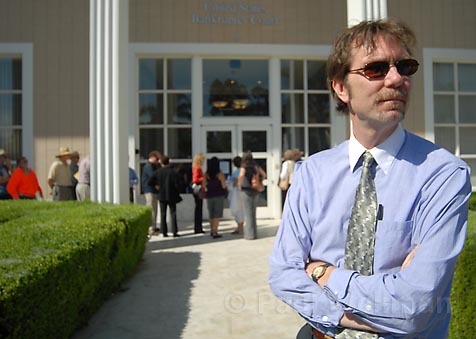
Cappello sought to impeach Todd’s credibility, getting Todd to admit that he’d been indefinitely suspended for making allegedly threatening remarks to part time photographer Ana Fuentes. Todd admitted he told Fuentes that he’d “have run her over,” but said he made the remark in jest. He chalked it up to his “black humor.”
Todd also testified that Burns job evaluations went down in part because he was ordered – as part of a newsroom policy shift – to be tougher on the evaluations. It wasn’t just Burns whose scores went down, Todd said, it was everybody’s. Burns’ scores, he said, ranged between “good and very good.” The trial is expected to extend through the last week in September.



